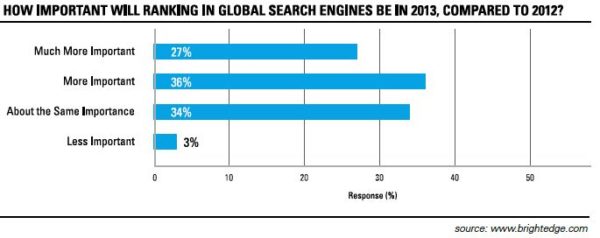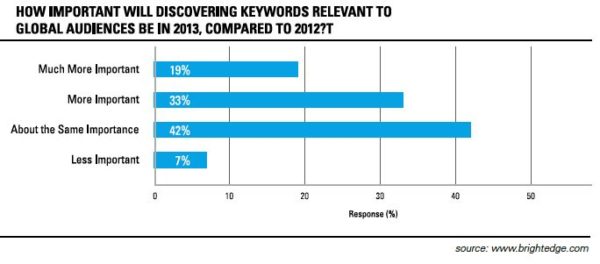How To Mine Your Local Market Site Search Keyword Goldmine
The lowly keyword phrase seems to be getting more attention these days. Last month, I spoke at SMX West about big data and co-optimization, then finished up at the International Search Summit with global keyword research and management. Based on the recently released 2013 Search Marketer Survey from BrightEdge, it appears as though global search […]
The lowly keyword phrase seems to be getting more attention these days. Last month, I spoke at SMX West about big data and co-optimization, then finished up at the International Search Summit with global keyword research and management.
Based on the recently released 2013 Search Marketer Survey from BrightEdge, it appears as though global search marketing activities might finally be top of mind for search marketers:

One of the areas getting a significant boost in interest is the discovery of keywords relevant to global audiences. The BrightEdge survey of Enterprise Search Marketers indicated that 50% of search marketers believe understanding global keywords will be more important in 2013 than in previous years, with nearly 20% indicating it is “Much More Important.”
Identifying Keyword Opportunities
Back in August, I provided my Minimalist Approach to Keyword Expansion based on product/solution stemming. This process involves making a list of what you do or sell and expanding it to include buy cycle terms and logical adjectives.
Reviewing your organic traffic by keywords through site analytics tools is a another great resource for identifying opportunities. These are words that are already bringing visits to the page, so creating targeted landing pages for those keywords (or further optimizing the existing pages for conversions) can give you a boost. However, this cannot be your primary tactic, since a lack of content or optimization may result in a lack of rankings for key phrases, missing out on significant opportunities.
A practice that is not as popular as it should be is to pull words from your localization glossary. These are guides that translators use to identify the approved local variation of words. Note: while linguistically correct, these might not be the most popular variations.
All three of the above are sound approaches, and when coupled with some quick paid search tests to validate market interest, it makes for a quick and easy method for prioritizing content creation.
Mining Local Language Site Search Query Logs
Since we have added site search keyword data to our Azimuth Keyword Management System, many of our clients have been able to leverage local market site search data as a source for keywords. These words are great indicators of local market interest since users did the search on your site, meaning they already associate with your company and your product or service.
In one case, the client actually found that 65% of site search queries for a set of keywords came from paid search visits in which the visitor was directed a landing page with a too-narrow focus — meaning they had to use site search to find what they wanted.
Giving Answers To Questions
One of the users of our keyword management tool recently shared some data with me on a data mining exercise they did, wherein they had delved into their site search data looking for questions. These simple queries containing the standard “who,” “what,” “where,” “when” and “which” modifiers resulted in over 27,000 questions from a surprising 600,000 queries.
Unfortunately, in 60% of the cases, there was not a result or a clicked result. Over two-thirds of the questions came from outside the US, which helped them identify specific problems not only with marketing but also with messaging.
Further mining revealed that 15% of questions and about one-quarter of the search volume to be monetized. Popular questions were related to upgrades, annual passes and discounts, etc. By creating a page that not only answered the question but also had a conversion element, they found they could typically convert 10 percent of those searchers. This meant a potential of just over $4.5 million in incremental revenue. Note: they did not have content for 60% of these questions, so that is where they focused their opportunities.
Based on this analysis, they went on to prioritize content creation, creating targeted pages designed to answer these questions based on revenue potential, volume and language overlap for scale. How many questions are you not answering that you should be?
There is no shortage of data available to global marketers; unfortunately, the problem is often the lack of resources to mine and model it. Don’t try to boil the ocean and do all countries, but scrape the surface and generate small-scale success that helps support your business case for better alignment, integration and awareness of consumers’ needs and wants.
Contributing authors are invited to create content for Search Engine Land and are chosen for their expertise and contribution to the search community. Our contributors work under the oversight of the editorial staff and contributions are checked for quality and relevance to our readers. The opinions they express are their own.
Related stories
New on Search Engine Land

